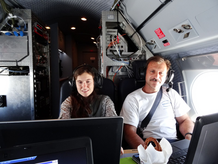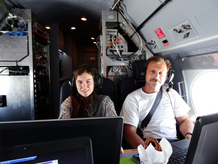Press releases

Distinction for Mainz cloud researcher
Physicist Mira Pöhlker is awarded a Minerva Fast Track position at the Max Planck Institute for Chemistry
April 25, 2018
The Max Planck Society (MPG) annually awards two Minerva Fast Track positions in the Chemistry, Physics and Technology Section to provide support for young scientists on their way to achieving their own research group. Due to her outstanding research achievements, Mira Pöhlker, who works at the Max Planck Institute for Chemistry (MPI for Chemistry) in Mainz, will receive one of these positions this year. She investigates the atmospheric processes leading to the formation of clouds and precipitation, in particular the role of aerosol particles serving as cloud condensation nuclei.
Mira Pöhlker, nee Krüger, studied physics at the Johannes Gutenberg University in Mainz and conducted research in elementary particle physics with ultra-cold neutrons during her diploma thesis. She has been working at the MPI for Chemistry since 2012, where she initially worked in the Department of Biogeochemistry headed by Meinrat O. Andreae; in 2013 she moved to Ulrich Pöschl's new Department of Multiphase Chemistry.
At the end of 2017 Mira Pöhlker completed her dissertation on the "Investigation of atmospheric aerosol and cloud condensation nuclei under pristine and polluted conditions" at the Max Planck Graduate Center with the Johannes Gutenberg-University Mainz (MPGC) with distinction and the top grade summa cum laude. The outstanding results of her doctoral thesis and further studies have been published in more than a dozen articles in leading international journals
Currently, Mira Pöhlker is heading a project to measure cloud condensation nuclei on board the HALO research aircraft. Combining the aircraft data with ground-based long-term measurements in the Amazon Rainforest Observatory ATTO, she gains new insights into aerosol-cloud-interactions in a largely pristine atmosphere, which constitute an important baseline for the development of reliable atmospheric and climate models. "In order to make more accurate predictions about human-induced climate change, it is important to understand how atmospheric, and especially cloud formation, processes occurred in pre-industrial times. With the aid of data from regions still largely untouched by humans, such as the Amazon rainforest, we are trying to understand these processes", explains die 29-year-old scientist.
The Minerva Fast Track programme offers funding for a two-year period. During this time, the physicist plans to carry out further investigations using the HALO research aircraft, at the Amazon Rainforest Observatory ATTO and at the Ragged Point Atlantic Coastal Observatory in Barbados, where new measurement methods will also be used. The results of her research flights and ground-based observations will be integrated into atmospheric models and compared with satellite measurements to quantify the effects of atmospheric aerosols on cloud formation. Following this, and with a positive assessment of further research work, the Mainz-based scientist can apply to establish a Max Planck Research Group.
"The Minerva Fast Track position is a great honor for Mira Pöhlker and her outstanding scientific work. It offers an excellent basis for continuing her projects and building up her own group", Ulrich Pöschl, director of the MPI for Chemistry, is pleased to announce.
